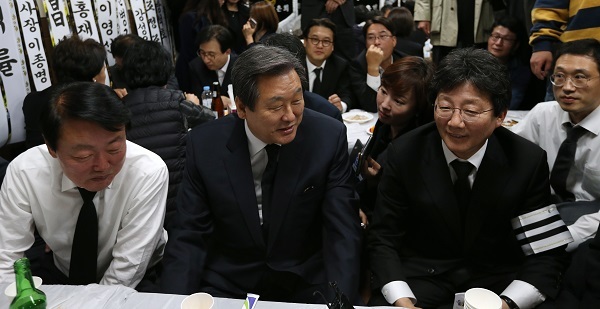While grieving for the loss of loved ones, mourners in Korea usually stay up all night in funeral halls to support the bereaved families. Drinking beer and soju, the guests console the family members during the three-day funeral period, sharing a common human bond during tough times.
For politicians in Korea, this tradition often serves as not just a somber chance to pay condolences but also as an opportunity to gather, recollect forces and even strategize against political foes.
Taking their armor off in the unusual setting, their private conversations often end up making headlines.
This tradition of so-called politics of condolences was most recently and blatantly exhibited at a funeral in Daegu over the past few days, when political heavyweights both from the conservative and progressive blocs came to console Rep. Yoo Seong-min, former Saenuri whip, who lost his father. Yoo’s father, Yoo Su-ho, who passed away at the age of 84, was himself a veteran politician.

The press encamped at the funeral house located at a hospital, recorded and reported every encounter made by Yoo and his high-profile guests, and especially took note of those who were not present.
More than one-third of the 297 incumbent lawmakers paid a condolence visit to Rep. Yoo including key figures of the pro-Park Geun-hye faction within the Saenuri Party, who once turned their back on him after the president blasted him for being disloyal to her in June, holding him responsible for her key bills stalling at the National Assembly. Yoo soon after resigned as the floor leader.
The list of guests included supreme council member of Saenuri Rep. Seo Chung-won, Deputy Prime Minister Choi Kyung-hwan and former presidential aide for political affairs Rep. Yoon Sang-hyun.
Retired bigwigs also came, including Lee Hoi-chang, former leader of the Grand National Party, predecessor of Saenuri.
The gathering mimicked the on-going political dynamics, with Lee telling Yoo that the president should have embraced him if she truly wants to be a successful leader. The president had entered politics under the wing of Lee but their relations soured over nomination rules that even led to Park temporarily bolting from the party.
“When I saw President Park (accusing) Rep. Yoo of (playing) the politics of betrayal, I was surprised. I felt sad,” said Lee. “To be a successful president, she should have embraced a talented lawmaker like Yoo, who speaks with his own beliefs.” Yoo has been a trusted associate of Lee since his political debut in 2000.
Saenuri leader Rep. Kim Moo-sung, who also has uncomfortable relations with the president, made his visit to the funeral, standing up for Yoo, calling him a great asset for the ruling party.
Kim half-jokingly mentioned their efforts made during Park’s campaign in the past. “(We all three) worked really hard for President Park,” said Kim, pointing out Yoo and another Saenuri member Rep. Han Sun-kyo who sat next to him. “Indeed it seems,” Yoo replied as they took another shot of alcohol.
News reports also highlighted the absence of Cheong Wa Dae figures, including the customary condolence flowers sent in the name of the president for funerals of politicians’ families.
Only a wreath of flowers was delivered to him under the name of her Chief of Staff Lee Byung-ki.
Cheong Wa Dae later told reporters that the office has no plan to send flowers to respect the wishes of the bereaved family, who said they would not accept flowers or monetary gifts for the funeral.
“Please understand it was out of respect for the deceased and the family,” said presidential spokesman Jung Youn-kuk denying there was any political meaning.
By Cho Chung-un (christory@heraldcorp.com)











![[Today’s K-pop] BTS pop-up event to come to Seoul](http://res.heraldm.com/phpwas/restmb_idxmake.php?idx=644&simg=/content/image/2024/04/17/20240417050734_0.jpg&u=)




![[KH Explains] Hyundai's full hybrid edge to pay off amid slow transition to pure EVs](http://res.heraldm.com/phpwas/restmb_idxmake.php?idx=652&simg=/content/image/2024/04/18/20240418050645_0.jpg&u=20240419100350)

![[Today’s K-pop] Zico drops snippet of collaboration with Jennie](http://res.heraldm.com/phpwas/restmb_idxmake.php?idx=642&simg=/content/image/2024/04/18/20240418050702_0.jpg&u=)